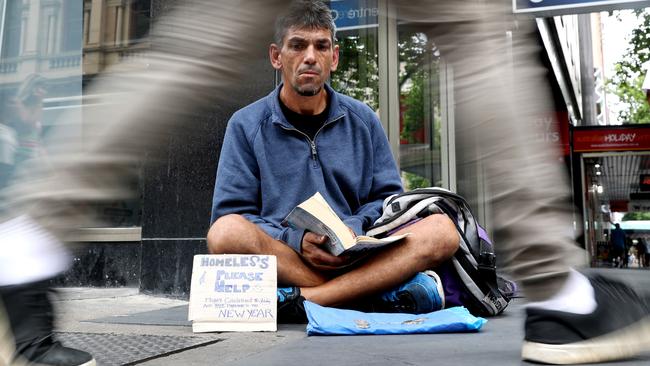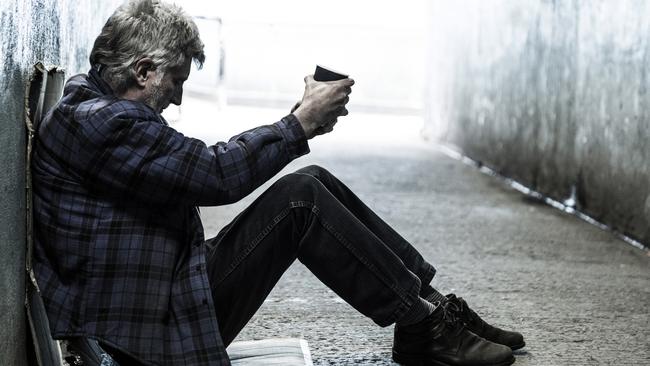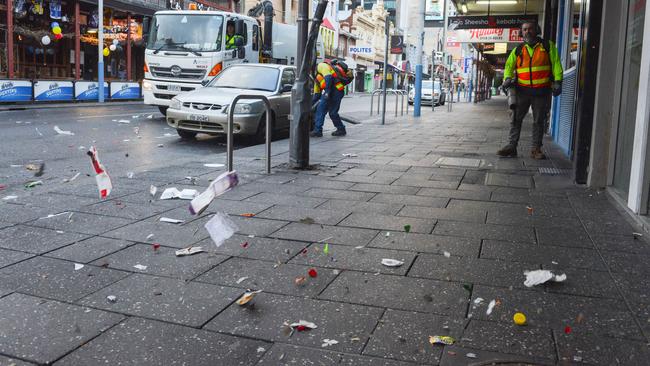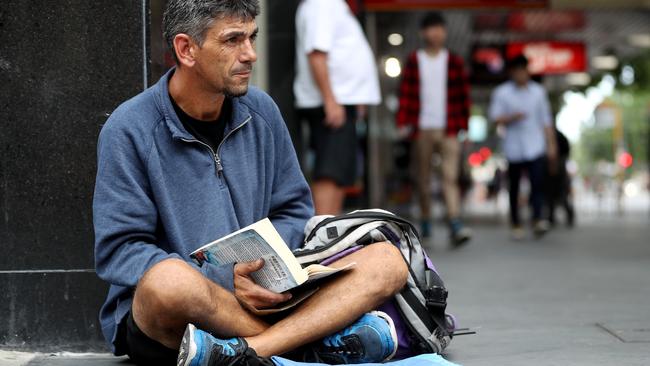Adelaide’s homeless problem extends beyond just rough sleepers on the street
SOME people drop in a few dollars. Some just walk on by. Many have noticed more homeless people around Adelaide. Here’s why.

SA News
Don't miss out on the headlines from SA News. Followed categories will be added to My News.
- Domestic violence leading to more homeless women across Australia
- Shelter SA warns of ‘tsunami of rough sleepers’
- Thousands of older South Australians could become homeless
- Adelaide commits to zero homelessness through Zero Project
- Worrying rise of vulnerable, homeless and jobless people
WHEN most people picture a homeless person, they’re thinking of a rough sleeper.
They have an image in their head of someone dishevelled, maybe with a hat out for loose change, or a handwritten sign holding a fragment of their personal story.
In reality, most homeless people are hidden from sight. They are women living in cars, trying to keep their children safely off the streets. Or they might be someone who surfs from couch to couch, struggling from night to night.
Rough sleepers are the hardcore, visible minority. While there are thousands of homeless people in South Australia, rough sleepers probably only number in the hundreds, maybe less.
They slip through the cracks in our systems. They don’t necessarily have contact with the support services who keep statistics.
And they are often treated without sympathy by shopkeepers who want them off their stoops, by people who don’t want to face a beggar, and by authorities who would prefer they didn’t clutter up the city.
But most of them have nowhere to go. Many are disabled, plenty have mental health issues. Getting into the private rental market is out of reach, public housing is scarce.
A recent report from the Australian Institute of Health and Welfare found there is a complex set of reasons why people end up without a safe home. But top of the list is simply not being able to get a proper house.

Alice Clarke from Shelter SA told The Advertiser that South Australia has the highest proportion of returning clients – that means people are getting housed, but for various reasons are unable to stay there.
“It’s got a lot to do with affordability in the private rental market, the decrease in numbers of public housing and we can see that we’re actually providing far fewer nights of accommodation to clients,” she said.
Dr Clark says the rough sleepers are five per cent – “at the most” – of those experiencing homelessness.
But they’re the visible part, and arguably more at risk.
Theirs is a vulnerable existence.
The SA Council of Social Service says there are very few options once people are sleeping rough.
“What most casual observers would say is that there’s been an increase in the numbers of people sleeping on our streets,” SACOSS chief executive officer Ross Womersley said.
“In part it’s because there has been an increase in those numbers and we haven’t yet found a good way to ensure that people exit homelessness as quickly as possible.
“And some of those people are making very active decisions to stay where they are because they feel like it might be where they’re safest.
“Being in a place that’s well lit and that is visible to people passing all the time, for some people it affords them a sense of security.”
The State Government has funded about 80 homelessness programs.
Recently created projects include the Inner City Street Crew to work with rough sleepers, and the Zero Project; whose stated aim is to get homelessness down to zero.

There are various policies but never enough money, and so as people do their Christmas shopping this year, they will come across people who are hoping for nothing more than something to eat. One age-old question people ask themselves when they see homelessness, is “should I give money?”.
Well-meaning folks worry the cash will go on drugs or booze. Others worry more broadly about supporting a dependent section of society.
Mr Womersley told The Advertiser people should realise that one of the worst things is just to ignore people.
“I’d encourage people to be as generous as they can. You don’t start begging for money when you don’t need it,” Mr Womersley said.
Imagine how hard and “shaming” it is to ask for money, he suggests. “It’s not our job to moralise.”

Bojan Rizmal sat in the heat yesterday, with a sign wishing people a Merry Christmas and asking for some help.
The 44-year-old, originally from Melbourne, has been travelling around the country after his wife and son were killed in a car accident. Accommodation here fell through and there are few other spots around, so he has ended up sleeping rough in the CBD.
It’s pretty dangerous, he says. Drunk idiots abound in the Christmas season.
“But it’s safer to be in the city than past the bridge,” he says of the Torrens spot that’s a common homeless haunt.
“It’s best to be in the light, where you’re seen.
“A camera’s not going to save you.”
Yesterday he was trying to get enough cash for a meal; he’ll think about Christmas later – it’s also his birthday.
After that he plans to head to find family in Brisbane.
He’s passing the time reading or studying.
Perhaps surprisingly, he has found people in Adelaide to be generous.
“Some are judgmental. They block you from their peripheral vision,” he said.
“But a lot of people are very generous.”


